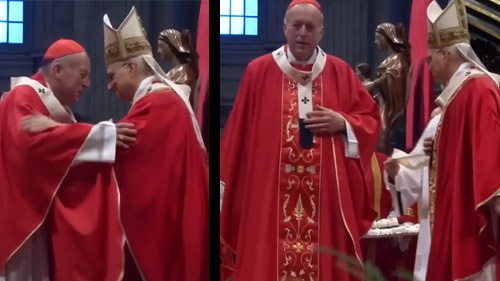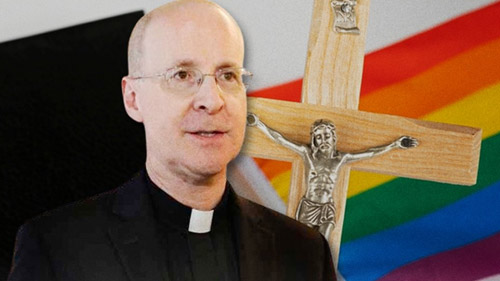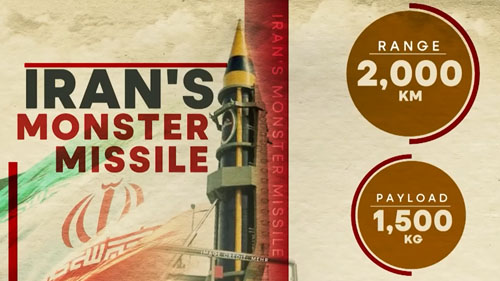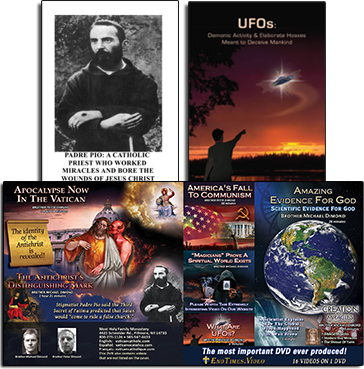June 20, 2005I believe that those who have seen all the evidence against John Paul II – for instance, the Assisi abominations; his teaching that we shouldn’t convert Schismatics; his Joint Declaration with the Lutherans on Justification; his desire to promote Islam and Islamic culture; his acceptance of all religions as more or less good; his teaching that all men are saved; his teaching that the Holy Ghost is responsible for non-Christian religions; his teaching that there are Saints and Martyrs in non-Catholic religions; his teaching that non-Catholics can receive Holy Communion; etc., all of which are covered in our video Why Antipope John Paul II Cannot Be the Pope – and still say that he is a Catholic and not a heretic, are committing a sin about as bad as worshipping Satan.
June 19, 2005We had heard the same thing, but the answer to your question is No. Padre Pio never told John Paul II that he would be Pope. In an article in Inside the Vatican, John Paul II was asked about this and admitted that Padre Pio never told him this. But the myth was spread all around nevertheless. But Padre Pio did throw John Paul II out of the Confessional during his visit to San Giovanni Rotondo in 1947.
Antonio Pandiscia is the official biographer of Padre Pio and he was the only man allowed to interview him more than once. He said: “The current Pope [sic] went to San Giovanni Rotondo for the first time in 1947 shortly after his ordination. A witness, who has since passed away, told me that Padre Pio was brusque with the young Polish priest on that occasion. I think he could not accept the fact that the young Wojtyla (John Paul II) had worked in the theatre before becoming a priest.” (Inside the Vatican, August/September, 1996, p. 12.)
June 16, 2005Jesus didn't have any sin. And you shouldn't read books that attack Our Lord. That is a very bad occasion of sin. These books are written by Satan, and those who entertain such demonic attacks on the true God allow Satan into their souls to destroy their faith. That is why those who read nonsense like The Davinci Code or some other Satanic garbage, unless it is with the very unusual task of an expert reading it solely to expose it, offend Our Lord gravely and show they don't really believe in Him.
June 15, 2005
Mr. Sungenis’ statement here is nonsense. One example is sufficient to explode it.
A Sacrament cannot take place without matter or form.
This is a true statement which means that both matter and form are necessary for a sacrament. If we substitute “except through” for “without” we see that the meaning is changed and the statement is rendered false.
A Sacrament cannot take place except through matter or form.
This is a false statement which indicates that either matter or form is sufficient for a sacrament. It means something different from the statement above. Thus, “except through” does not always mean the same thing as “without.”
I continue with Mr. Sungenis’ response:
Sungenis: Let's look at both possibilities:
First using "except through"
"...and this translation after the promulgation of the Gospel cannot be erected [sic] except through the laver of regeneration, or a desire for it, as it is written..."
Now with "without":
"...and this translation after the promulgation of the Gospel cannot be erected [sic] without the laver of regeneration, or a desire for it, as it is written..."
The latter usage would clearly indicate that one cannot be baptized without water or the desire for water, and thus the condition of using water is fulfilled both in the usage of "without" and "except through."
Lastly, I would suggest that whoever is trying to teach you that there is no such thing as a baptism of desire cease and desist. This is a dogmatic teaching of the Church, and it is infallible. Any attempt to alter it will simply bring terrible consequences.
Sungenis’ comment here doesn’t make sense. He has confused the entire subject of Sess. 6, Chap. 4, which is what cannot be missing in Justification, and confused it with what is necessary for baptism. Baptism of desire has never been taught by the Catholic Church.
Those who deny baptism of desire will not suffer terrible consequences. No, Mr. Sungenis, your denial of the defined dogma that the Sacrament of Baptism is necessary for salvation has brought down on your head terrible consequences.
Pope Paul III, The Council of Trent, canons on the Sacrament of Baptism, canon 5, ex cathedra: “If anyone says that baptism [the sacrament] is optional, that is, not necessary for salvation (cf. Jn. 3:5): let him be anathema.”
Your consistent and deliberate misquoting of the Council of Trent has brought down on your head mortal sin.
Pope Pius IX, Singulari Quadam: “For, in truth, when released from these corporeal chains, ‘we shall see God as He is’ (1 John 3:2), we shall understand perfectly by how close and beautiful a bond divine mercy and justice are united; but, as long as we are on earth, weighed down by this mortal mass which blunts the soul, let us hold most firmly that, in accordance with Catholic teaching, there is ‘one God, one faith, one baptism’ [Eph. 4:5]; it is unlawful to proceed further in inquiry.”
Pope Paul III, Council of Trent, Sess. 6, Chap. 4: “In these words there is suggested a description of the justification of the impious, how there is a transition from that state in which a person is born as a child of the first Adam to the state of grace and of adoption as sons of God through the second Adam, Jesus Christ our savior; indeed, this transition, once the gospel has been promulgated, CANNOT TAKE PLACE WITHOUT the laver of regeneration or a desire for it, AS IT IS WRITTEN: Unless a man is born again of water and the Holy Spirit, he cannot enter the kingdom of God (John 3:5).”
God made sure that the words “as it is written” were included in that very sentence to ensure that the Council was not teaching baptism of desire by its wording in that passage. The passage thus teaches – as it is written – unless a man is born again of water and the Holy Ghost he cannot enter into the Kingdom of God. And if what baptism of desire proponents say were correct, we would actually have the Council teaching us in the first part of the sentence that John 3:5 is not to be taken as it is written (desire sometimes suffices), while simultaneously contradicting itself in the second part of the sentence by telling us to take John 3:5 as it is written (sicut scriptum est)! But this is absurd, of course. Those who obstinately insist that this passage teaches baptism of desire are simply wrong and are contradicting the very words given in the passage about John 3:5. The inclusion of “AS IT IS WRITTEN, unless a man is born again of water and the Holy Spirit, he cannot enter the kingdom of God (John 3:5)” shows the perfect harmony of that passage in Trent with all of the other passages in Trent and other Councils which affirm the absolute necessity of water baptism with no exceptions.
June 15, 2005We're very glad to hear that you found the website. The New Mass is not valid, because it has a changed form of Consecration. A Catholic must not attend it under any circumstances. The article near the top of the website explains why the New Mass cannot be valid.
Also, no Catholic should pray the Luminous Mysteries because they were added by Antipope John Paul II, who is not a valid Pope. If you have more questions, let us know.
June 12, 20051. The faithful Catholics left in the world are those who maintain the true Faith.
2. I don't know the number of those.
3. If pride is grave then it will lead to mortal sins which will put a person in hell. And “pride is the beginning of all sin” (Ecclus. 10:15). Pride causes man not to pray as much, not to fear sin, not to listen to what they should or to whom they should, not learn what they need to know. Pride causes people to dismiss truth or people speaking the truth by finding fault with petty things. We’ve dealt with many people who, though they don’t have haughty personalities, admit that they commit mortal sins and yet they are still critical of others’ spiritual lives. Frankly, if they commit any mortal sin then they shouldn’t be criticizing anybody. But they cannot see their decrepit state because they are filled with pride: “…knowest not, that thou art wretched, and miserable, and poor, and blind, and naked.” (Apoc. 3:17) They don’t fear to offend God by their mortal sins because they are filled with pride.










 " />
" /> " />
" /> " />
" /> " />
" /> " />
" />





